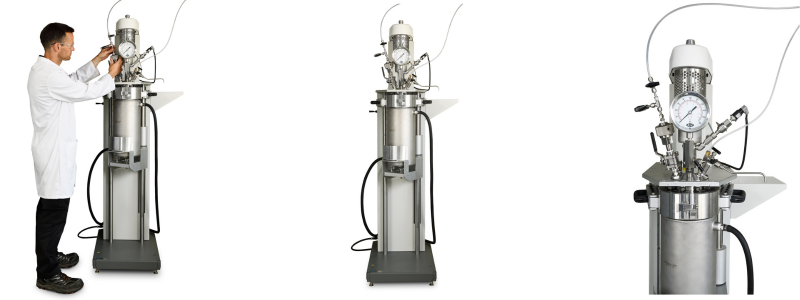PROJECT CASE STUDY
Outline:
Developing a novel process for an existing product line resulted in greater sustainability, higher yield, removal of an expensive catalyst with a cost saving of millions each year.
Industry:
Coating Product Ingredients
Publish Date:
June 2023

Photo shows the 5 kg reaction vessel designed and used in the work.
Introduction
Our client is a leading international specialty chemical company with multiple R&D and manufacturing locations around the world. They supply materials for use in a range of sectors and product types. We had previously worked on their behalf on other process development projects.
The Brief
Stage 1: Compare an existing chemical synthesis with a newly developed process that the client had developed with the intention of recovering and recycling the catalyst system.
Stage 2: Reaction charaterisation and optimisation prior to scale up.
Stage 3: Following success in stage two the client wanted to continue the work with us to include scaling up the reaction from the 50g lab scale to a multi- kg pilot scale system.
The Challenges
- Dealing with a highly sensitive reaction
- No validated analytical methods available for the reaction
- The reaction had not been fully characterised
Key Achievements
- Reaction time halved
- Complete removal of expensive catalyst
- Product yield increased by a fifth
- Anticipated savings for our customer expected to be in the millions per year
The Project
The first stage of the brief was to compare an existing chemical synthesis with a newly developed process that the client had developed with the intention of recovering and recycling the catalyst system.
The customers’ existing process did not allow for catalyst recovery, and with increasing material costs this had become uncompetitive. The client had initiated the work and continued to work themselves on the catalyst recovery system.
Their brief to us was to characterise the reaction and optimise it prior to scale up, but in the course of the work the brief was extended to a second stage to include a more significant improvement following great success in stage 1.
Our Approach
Work was carried out in several stages, first at laboratory scale and then at pilot scale.
STAGE 1:
The first stage was to develop an improved analytical method (GC), and to carry out a survey of reaction conditions carried out including temperature, catalyst loading, catalyst type, and reagent addition rates. These two activities ran in parallel, and the starting point was the data previously generated by the client. The outcome of this stage was a characterisation of the reaction mechanism and kinetics, and a confirmation that the proposed catalyst recovery and re-use was feasible. Altogether this gave an increased the confidence for the client to proceed with further development.
STAGE 2:
Involved further detailed characterisation of the reaction by-products in terms of the two intermediate species identified. This required isolating the intermediates and reacting them individually. The intermediates were not available off-the-shelf and had to be synthesised. The work resulted in a detailed reaction scheme that showed which impurities could be eliminated, and which were formed irreversibly and could not.
An additional exploratory study was made at this point to see whether switching from a batch to a continuous process would allow the by-product levels to be reduced further, prompted by an improved understanding of the reaction mechanism. This work was carried out in an agitated cell reactor. In the event the required balance between conversion and purity could not be obtained and this route was not pursued.
STAGE 3:
The reaction mechanism was investigated further, again using isolated intermediates. For the first time the reactions were carried out under pressure. The outcome here was to confirm the preferred reagent addition rates for the batch process and the desirability of a pressurised system.
The use of heterogeneous catalyst addition as opposed to solution addition was then investigated, based on insights from the reaction mechanism. This proved to be a breakthrough and resulted in the possibility to eliminate the expensive catalyst component altogether as well as a significant increase in yield. This was confirmed in a proof-of-concept reaction that then formed the basis of a process free of the expensive catalyst.
The next step was to scale the reaction from the 50 g lab scale to 5 kg pilot scale. This required the purchase and commissioning of a bespoke reactor, suitable for operation at 300 ºC and 10 bar pressure. The outcome was a package of reaction data, including information about critical exotherms, that the client then used as the basis of an engineering study. At C-Tech, we are currently mimicking a modelled plant process to transfer the reaction to the main plant at 80 m3 scale.
The Results
The outcome of the work is a process that exceeded the brief. The expensive catalyst was removed altogether, the yield increased by a fifth and the reaction time halved. The anticipated annual savings are several millions of euros per year.
This successful outcome was supported by the strong working relationship. There was an ongoing exchange of data and insights between the parties, and the client encouraged us to pursue the possibilities that arose as we understood more about the reaction. The client was able to manage the progress and budget by contracting for the work in stages.
For C-Tech Innovation the work showcases our ability to bring insight and creativity to chemical process development, and to combine synthetic chemical and chemical engineering expertise from the project outset.
“C-Tech has been able to apply its expertise in organic process development to provide the customer with a novel route to a current high- volume product. The process changes made allow increased throughput with a much lower cost base.”
Edd Jones Project Lead
Are you looking to partner with a company for Chemical Process Development & Scale-up?
Transform your chemical manufacturing process with C-Tech Innovation
+44 (0)151 347 2900
